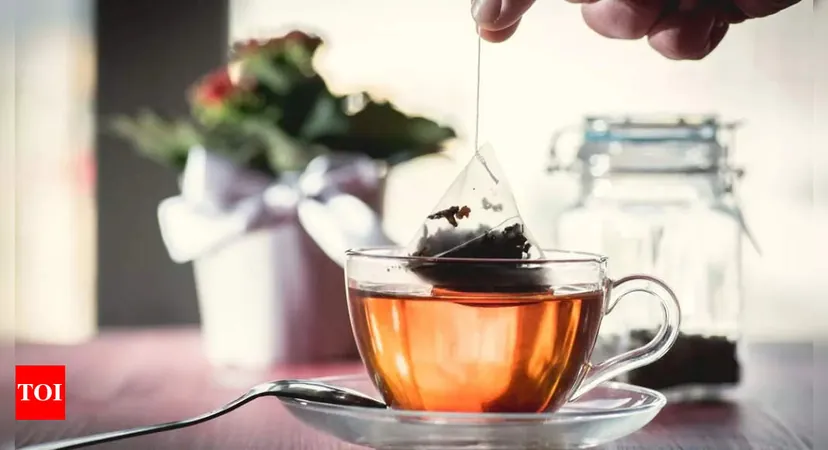
Shocking Study Reveals Your Favorite Tea Might Be Infested with Microplastics!
2024-12-25
Author: Yan
Shocking Study Reveals Your Favorite Tea Might Be Infested with Microplastics!
Recent research from the Autonomous University of Barcelona has uncovered a startling truth: your beloved polymer-based tea bags might be releasing billions of microplastics and nanoplastics into your cup of tea. This could mean these tiny particles are sneaking into your bloodstream and intestinal cells, posing serious health risks! But don’t worry—there are ways to protect yourself while still enjoying your daily brew.
According to the ground-breaking study published in the journal Chemosphere, tea made from synthetic materials like nylon-6 and polypropylene is to blame. During the brewing process, these materials release staggering amounts of micro and nanoplastics. For instance, tea bags made from polypropylene can emit around 1.2 billion particles per milliliter, with an average size measuring just 136.7 nanometers. In contrast, cellulose tea bags release approximately 135 million particles at an average size of 244 nanometers. Even nylon-6 bags yield 8.18 million particles per milliliter at an average of 138.4 nanometers.
But what does this mean for your health? The researchers applied cutting-edge techniques to analyze how these tiny pollutants interact with human intestinal cells. After just 24 hours of exposure, the study found that certain mucus-producing digestive cells absorbed a considerable amount of microplastics—some particles even made it into the nucleus where our genetic material resides! This is particularly concerning as it may disrupt genetic processes, leading to potential long-term health issues.
Given that microplastics are rampant in our environment—from the air we breathe to the food we consume—this revelation about tea bags has prompted scientists to stress the importance of awareness regarding cumulative exposure.
What Can You Do?
Fortunately, tea enthusiasts can adopt some simple measures to minimize exposure to these harmful particles:
1. Go for Loose-Leaf Tea: By opting for loose-leaf varieties, you can completely dodge the risks associated with tea bags.
2. Choose Natural Materials: If you must use tea bags, select those made from paper or cotton instead of nylon or polypropylene.
3. Use Filtered Water: Brew your tea with filtered water to limit the presence of additional contaminants.
4. Handle Tea Bags Carefully: Avoid squeezing or tearing tea bags when brewing, as this can increase the release of microplastics.
The Benefits of Tea Are Still Worth It!
Despite these alarming findings, tea offers numerous health benefits, including:
- Rich in Antioxidants: Tea is packed with antioxidants that can help combat free radicals in the body.
- Heart Health: Regular consumption of tea can improve cardiovascular health and reduce the risk of heart-related diseases.
- Digestive Support: Herbal teas can alleviate digestive issues and promote a healthy gut.
- Enhanced Focus: The combination of caffeine and L-theanine found in tea can help boost concentration and focus.
- Supports Weight Management: Green tea, in particular, may help with weight loss by enhancing metabolism.
To further reduce your exposure to microplastics, consider avoiding plastic packaging, opting for glass containers instead, and ensuring that children do not have access to small plastic items that can be swallowed. Your health—and the environment—will thank you!
Stay informed and make smart choices in your tea-drinking habits!

 Brasil (PT)
Brasil (PT)
 Canada (EN)
Canada (EN)
 Chile (ES)
Chile (ES)
 Česko (CS)
Česko (CS)
 대한민국 (KO)
대한민국 (KO)
 España (ES)
España (ES)
 France (FR)
France (FR)
 Hong Kong (EN)
Hong Kong (EN)
 Italia (IT)
Italia (IT)
 日本 (JA)
日本 (JA)
 Magyarország (HU)
Magyarország (HU)
 Norge (NO)
Norge (NO)
 Polska (PL)
Polska (PL)
 Schweiz (DE)
Schweiz (DE)
 Singapore (EN)
Singapore (EN)
 Sverige (SV)
Sverige (SV)
 Suomi (FI)
Suomi (FI)
 Türkiye (TR)
Türkiye (TR)
 الإمارات العربية المتحدة (AR)
الإمارات العربية المتحدة (AR)